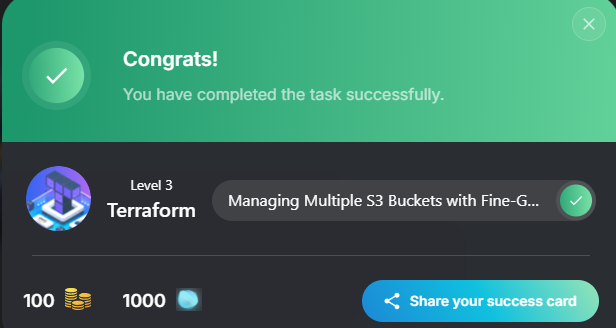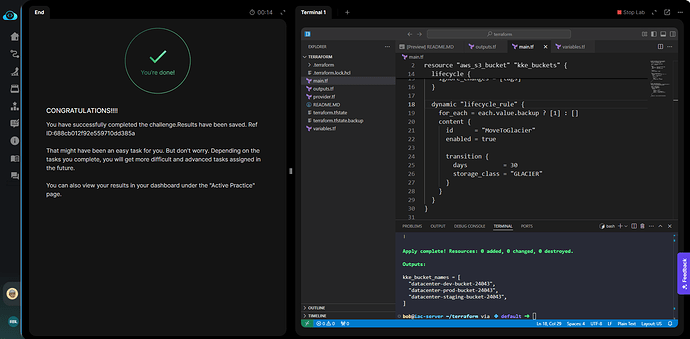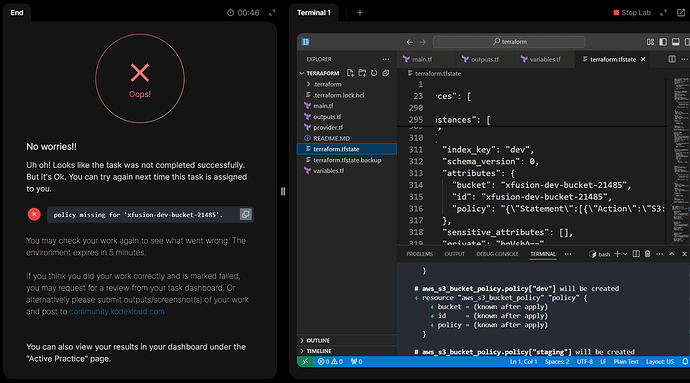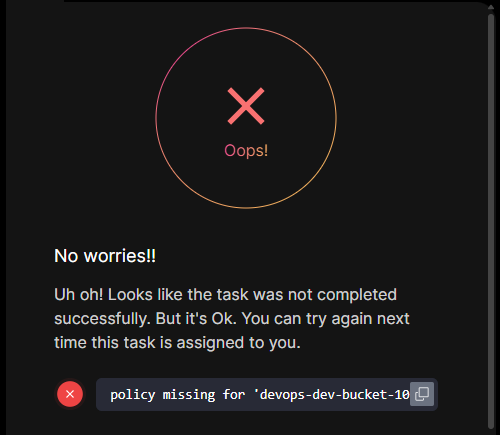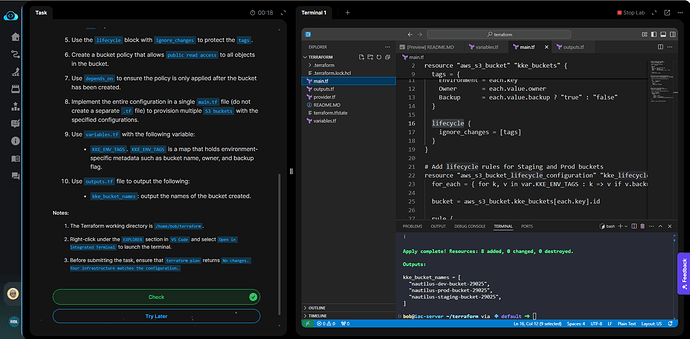Hello Folks,
Terraform Level-3 Task-7 is getting failed- “due to policy missing for ‘datacenter-dev-bucket-26876’”. However, terraform show commands display policy is created for dev bucket.
main.tf
######################################
Create S3 Buckets (Dev, Staging, Prod)
######################################
resource “aws_s3_bucket” “bucket_creation_using_for_loop” {
for_each = var.KKE_ENV_TAGS
bucket = each.value.bucket_name
tags = merge(
{
Name = each.value.bucket_name
Environment = each.key
},
each.value.owner != "" ? { Owner = each.value.owner } : {}
)
lifecycle {
ignore_changes = [tags]
}
}
######################################
Lifecycle Rules (for buckets with backup = true)
######################################
resource “aws_s3_bucket_lifecycle_configuration” “kke_lifecycle” {
for_each = {
for env, config in var.KKE_ENV_TAGS :
env => config if lookup(config, “backup”, false)
}
bucket = aws_s3_bucket.bucket_creation_using_for_loop[each.key].id
rule {
id = “MoveToGlacier”
status = “Enabled”
filter {
prefix = ""
}
transition {
days = 30
storage_class = "GLACIER"
}
}
}
######################################
Public Read Bucket Policy
######################################
resource “aws_s3_bucket_policy” “kke_bucket_policy” {
for_each = var.KKE_ENV_TAGS
bucket = aws_s3_bucket.bucket_creation_using_for_loop[each.key].id
policy = jsonencode({
Version = “2012-10-17”
Statement = [
{
Sid = “PublicReadAccess”
Effect = “Allow”
Principal = “"
Action = [
"s3:Get”,
“s3:List*”,
“s3:Describe*”
]
Resource = [
aws_s3_bucket.bucket_creation_using_for_loop[each.key].arn,
“${aws_s3_bucket.bucket_creation_using_for_loop[each.key].arn}/*”
]
}
]
})
depends_on = [aws_s3_bucket.bucket_creation_using_for_loop]
}
############################################
variables.tf
############################################
variable “KKE_ENV_TAGS” {
description = “Environment specific metadata”
type = map(object({
bucket_name = string
owner = string
backup = optional(bool, false)
}))
default = {
Dev = {
bucket_name = “nautilus-dev-bucket-31091”
owner = “Alice”
backup = false
}
Staging = {
bucket_name = “nautilus-staging-bucket-31091”
owner = “Bob”
backup = true
}
Prod = {
bucket_name = “nautilus-prod-bucket-31091”
owner = “Carol”
backup = true
}
}
}
############################################
outputs.tf
############################################
output “kke_bucket_names” {
description = “Names of the created S3 buckets”
value = [for b in aws_s3_bucket.bucket_creation_using_for_loop : b.bucket]
}
Can someone what went wrong here?
Thanks,
Sohel Khan.
